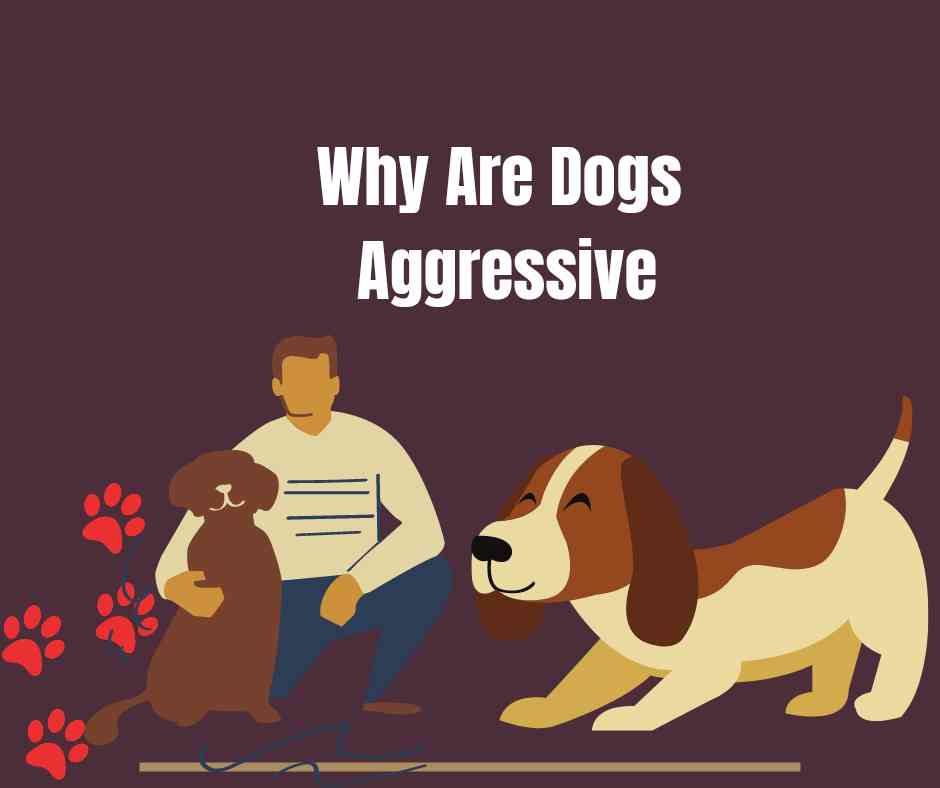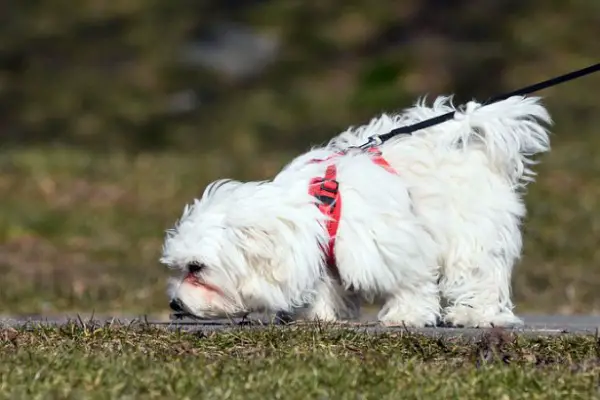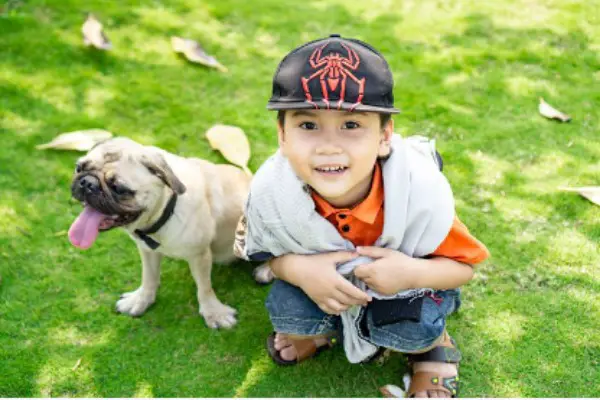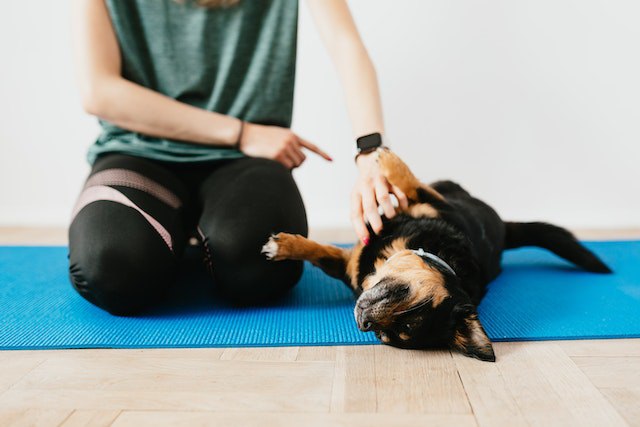Why Are Dogs Aggressive: 12 Common Causes & Solutions

Dog owners keep asking why are dogs aggressive, as an experienced dog owner with years of experience and my research I will outline all the common reasons why dogs are aggressive.
If you are a dog owner, you might have encountered this problem if your dog is aggressive.
It is not uncommon for dogs to show aggression and react to it when they feel threatened or something has caused them some kind of pain.
You may also notice that your dog may be aggressive towards other dogs in the neighborhood, especially if they are in heat and on heat cycles during mating season.
It is important to keep in mind that not all aggression is bad and there are many different reasons why dogs go on an aggressive rampage.
Why are dogs aggressive?
Dogs can be aggressive due to a variety of reasons, including fear, territoriality, or a lack of socialization.
Aggression in dogs is a complex behavior that can be influenced by genetics, past experiences, and environmental factors.
The key to managing aggression in your dog is to recognize the reasons for the aggression and then manage the behavior in a way that helps them get past their triggers.
Aggression is one of the most common behaviors in dogs. It’s also the main cause why vets and pet parents should consult with professional behaviorists and trainers.
Signs of aggression in dogs
Here are some clear signs of aggression in dogs you should always look out for:
- Pinned back Ears
- Nipping
- Baring Teeth
- Snarling
- Growling
- Temporary increase in size
- Stiff body posture
- Charging forward
Types of Dog Aggression
Here are the basic types of aggression found with dogs which are as follows:
- Maternal Aggression
- Possessive Aggression
- Territorial Aggression
- Protective Aggression
- Pain-Related Aggression
- Fear Aggression
- Sexual Aggression
- Predatory Aggression
- Redirected Aggression
- Social Aggression
Some health reasons for dog aggression
Here are some medical causes of dog aggression or some health challenges associated with dog aggression:
- Epilepsy
- Side effects of medication
- Brain tumors
- Encephalitis
- Head trauma
- Hydrocephalus
- Hypothyroidism
- Seizures
Causes of dog aggression
Here are some common reasons or causes of dog aggression:
Fear causes dog aggression
Most dogs only become violent when they perceive themselves to be in danger, are unable to flee, and feel compelled to protect themselves.
This might happen if a dog is forced into a corner with no way out, or if he believes a hand held over his head implies he’ll be whacked.
Approach unknown dogs with caution to prevent triggering aggressive behavior (better yet, let them approach you).
To assist your dog in avoiding fear in the future, train and socialize the dog.
It’s crucial to remember that when dogs feel danger at any time of day or night, they become hostile toward other humans or animals around.
Solution to fear aggression in dogs
So, whether it’s other dogs or humans, strive to remove all causes of fear in your home.
Fear can be alleviated by socializing your dog with other dogs as soon as possible.
This will educate your dog that other dogs or humans are not a threat while they are in the vicinity.
It will also teach your dog to be calm around other dogs or humans and avoid unnecessarily attacking them.
If you find it difficult to socialize your dog, one day your dog will attack a guest or other dogs, and you will label him an aggressive dog.
An unsocialized dog is one that you keep in your yard and train without taking it for walks or allowing it to interact with other dogs, pets, or even humans.
The dog may not even be aware of what is going on outside.
With this sort of training, you can’t even tell your neighbors your dog’s name since you want your dog to be less socially hostile.
Begin socializing your dog while he is a puppy, by taking him for an afternoon stroll or visiting the neighbors, so that when he is an adult, he will not have difficulty meeting people.
Here are tips on how to socialize a puppy.
Illness causes dog aggression
Dog illness can be defined as an illness or phase of an illness that affects the body or mind of a dog.
This can be caused by injecting tainted food or microorganisms into the body.
When your dog is sick, and you don’t pay attention to him for most of the time, he becomes hostile toward you, your family, and other pets.
Because of its condition, a sick dog is constantly aggressive and can attack other dogs.
Solution to dog illness aggression
These are some of the many causes that may cause disease in dogs: parasites, fungus, bacteria, viruses, and so on.
This can be caused by the environment or by eating certain foods. This provides an answer to the question of why my dog is hostile to other dogs.
So keep an eye out for indications of sickness in your dog and take him to the doctor for treatment.
Dogs are aggressive when they are frustrated
An enraged dog may attack anyone, including its owner. There are several variables that contribute to a dog’s high degree of aggressiveness when he is upset.
Paying less attention than normal, not paying attention to the dog, interfering with the dog’s feeding habits, etc.
Even humans are aggressive when they’re frustrated, so why shouldn’t dogs be aggressive when they’re frustrated?
Solution to dog frustration-aggression
Frustrated dogs might do unexpected things, so make sure your dog doesn’t become unhappy all of the time.
To tackle the problem of dog dissatisfaction, you must first identify the source of the problem and eradicate it as quickly as possible.
When the dog requires your attention, try not to ignore them.
Other dogs or animals should not be allowed to enter the dog’s feeding area.
Paying less attention than usual is not a good idea.
Dog aggression is caused by dog territorial behavior
If you correctly teach your dog and your dog is really devoted to you, you may anticipate your dog to be aggressive toward foreign guests who attempt to harm you.
This is the primary cause of dog aggression, and it applies to all guard dogs since they will always fiercely protect their owners.
When defending his puppies or house from other dogs, the dog becomes violent.
Solution to territorial aggression in dogs
Again, early socialization and obedience training is a simple way to solve the problem of territorial behavior in dogs.
Dog aggression is caused by a lack of proper training
This is the most comprehensive response to your inquiry regarding why my dog is hostile to other dogs.
Even military soldiers must educate their dogs before they start obeying instructions, as 60 percent of dog aggressiveness towards other dogs is caused by poor training.
As a result, you must provide your dog with proper training in order to reduce or eliminate aggressiveness against other dogs or humans.
Most dog owners believe that eating requires just training, despite the fact that effective training leads to reduced aggressiveness.
Solution to lack of training
There are many online training rangers to help you train your dog properly. Or you can attend dog classes or visit a dog behaviorist.
Possessive behavior in dogs leads to dog aggression
When you have a dog and acquire your dog’s toy and your neighbor’s children want to play with it, I’m sure the children will regret coming to your house first.
If your dog is eating and someone approaches the dog food area, you might expect some hostility.
Another instance is when a dog defends you or the surroundings against strangers or other dogs.
If you have to explain why my dog is violent toward other dogs or humans, the basic explanation is possessive behavior.
Solution to possessive behavior in dogs
You must educate your dog not to be overly protective of you or your belongings, and you must teach your dog that being around other dogs does not imply that you are insecure.
Visit other dog owners as much as possible and take your dog to dog parks, where you can snuggle and watch other well-trained dogs while telling your dog to sit and observe.
By doing so, your dog will begin to understand that the presence of other dogs does not pose a threat to you or your resources.
Presence of a new pet causes dog aggression
Most dog breeds like to be alone, so before you adopt one, find out what previous owners had to say about it or read internet reviews.
Even humans can see an excellent example of this idea.
Assume you’ve had a dog for four years and then BOOM!!! You decide to bring a cat in because a neighbor or acquaintance has one, and you have unwittingly encouraged violence in your home.
No matter how well-trained your dog is, you shouldn’t expect him to grin at you with this new Cat.
It is simpler to bring the two of them together so that they may develop together.
A dog in pain is always aggressive
This is an excellent explanation of why dogs are aggressive: if your dog is in pain, you may expect some aggressive behavior from him, including toward you as the owner.
Pain makes dogs uneasy, and it can be caused by illness or injury, so if your dog is acting aggressively, check to see whether it is hurt or unwell.
A dog’s pain might lead to a variety of unusual behaviors.
Discomfort can reduce their tolerance in a variety of settings, leading to aggression in some cases.
Pain is not only unpleasant, but it may also be highly stressful for a dog.
Dog abuse can lead to dog aggression
This is an excellent explanation of why dogs are violent; if you or your family mistreat any breed of dog, you can anticipate a high degree of aggression; dogs are not only aggressive when abused, but they also attack people.
An excellent example of this is unnecessarily punishing your dog and failing to pay attention to it when it is in need, as well as starving it.
Examples of ways you abuse a dog without knowing are:
- Starving your dog
- Not grooming your dog
- Rubbing your dog’s mouth on its poop
- Unnecessary shouting at your dog
- Beating up your dog, etc.
Showing less care can lead to dog aggression
This is one of the most important things, and it applies to both dogs and humans. It’s awful to own a dog you can’t care for.
It’s just best if you don’t have one because dogs that aren’t properly cared for may attack their owners sometimes.
Grab one of the numerous guard books on how to care for a dog that is available online and read it.
You won’t mind cleaning up after your dog or feeding him food from filthy dishes if he poos.
This is harmful and may cause your dog to become aggressive.
Anxiety can lead to dog aggression
Recent changes in a dog’s surroundings may be causing them to get nervous, resulting in aggressive behavior.
Anxiety might be triggered by the entrance of a new family member or the relocation to a new residence.
How to solve dog aggression
Here are some ways to deal with dog aggression which are as follows:
Consult experienced dog owner or trainer
When attempting to address the issue of how to stop your dogs from becoming aggressive, this is critical.
When your dog becomes very aggressive and you can’t figure out why, please call an experienced owner or trainer.
They will provide you with suggestions that may help you stop the aggression.
Long-term dog training will provide you with a wealth of expertise as a dog owner.
You cannot compare yourself to an expert dog owner; thus, if your dog becomes too aggressive, seek the advice of an experienced dog owner.
Identify and avoid potential aggressive triggers
If you can pinpoint a specific trigger for your dog’s aggressive trigger.
It’s essential to make life easy for them by avoiding the circumstances whenever possible.
While not all canine triggers are readily prevented, some are.
If your dog appears to be provoked by new animals entering your house, for example, it may be advisable to avoid bringing in any new pets.
Provide more interesting and interactive toys
The play items you purchase for your dogs will have a big impact on how aggressive they are.
There are many different sorts of play toys for dogs, and you may buy up to five different ones and let your dog choose.
Keep an eye on your dog to observe which of the play toys makes him happy or want to play more.
Dogs have been shown to be happier when they are playing with toys, as seen by their jumping up and down.
Also, keep in mind that a happy dog has less time to be aggressive. This is something I’ve tried and it works.
Pay more attention to your dog’s needs
This is an excellent technique to reduce dog aggression and foster a deep bond between you and your dog.
If your dog wants to play or needs something, it will approach you with a wagging tail, and you should not completely ignore it.
When you see your dog’s tail wagging or barking, pay attention to him. This is a fantastic technique to decrease dog aggression.
Maintaining the same daily routine for your dog
This may sound ridiculous, but it works; all it takes is a decent eating schedule.
For example, if you train your dog to eat between 7 and 8 a.m. every day and then start feeding him at 11 a.m., do you anticipate him to be hostile since his stomach is already conditioned to eat by 7 a.m.?
Stop altering your dog’s food schedule whenever you wish to assist them in becoming less aggressive.
Make a timetable for yourself and stick to it.
If you modify your feeding schedule, stick to it; don’t go back to the previous one.
Changing your dog’s food routine will make him feel neglected and unloved. Dogs, too, have feelings.
Devoted care and regular vet visits
When dogs are properly cared for, they are less aggressive.
Caring for a dog entails a variety of tasks such as feeding, exercising, socializing, washing, attention, training, and regular visits to the veterinarian.
Examine the whole list above and make any necessary changes to decrease the likelihood of your dog becoming violent.
Also, remember that most concerns with your dog may be resolved by seeing a veterinarian.
Where to surrender an aggressive dog
If you have tried, all you have learned from this, and you can’t still stop your dog from being aggressive here are places you can surrender such a dog:
Dog training facilities
In every nation, there are several dog training centers; these institutions already have a unique technique for dealing with violent dogs; simply call them.
Dog rescue groups
Dog rescue groups are organizations committed to assisting dogs that have lost their way or have gotten away from their owners.
Aggressive dogs are dealt with in a unique way by this organization because they have experience, as animal behaviorists.
Experience dog owner
If you find your dog has become overly aggressive, and you are unable to follow any of the recommendations provided here.
Or if you have done so and your dog remains aggressive, seek the advice of an experienced dog owner.
Dog rehabilitation centers or shelters
A dog rehabilitation center is a perfect place to drop or rehabilitate your aggressive dog.
On the other hand, even though a shelter is a good place to keep a homeless dog, some shelters have contact with animal behaviorists.
Final Thoughts
Dogs are known for their loyalty and companionship.
However, it’s important to know that not all dogs are aggressive towards strangers.
Aggression in dogs can be situational or behavioral.
For example, a dog might show aggression when home alone with nothing to do or if there is a new dog on the block.
Dogs are also territorial and will aggressively defend their homes and family members.
It’s always best to train your dog from an early age, so they know what is acceptable behavior.
So do your best to avoid unnecessary actions or environments that can cause a dog to be aggressive.






